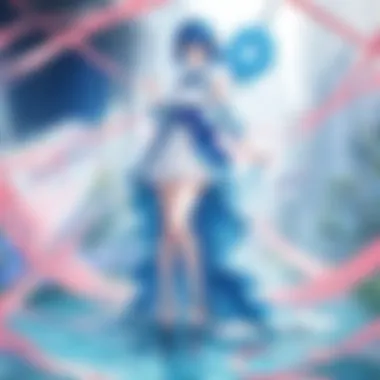Exploring Blue Spring Ride: An In-Depth Analysis


Intro to the Series
Blue Spring Ride (Japanese: 青春 × 構わん, Seishun x Kamawan) is a Japanese anime series that first aired in 2014. It is based on the manga written and illustrated by Io Sakisaka, falling within the shoujo genre, which primarily targets a young female audience. The fourteen-episode series is notable for its blend of romance and teenage angst, resonating with viewers who appreciate character-driven narratives.
This anime chronicles the tumultuous nature of first love, friendship, and self-discovery. Set in a high school environment, it follows the story of Futaba Yoshioka, a girl who longs to be accepted by her peers and confronts past heartbreaks. The series has become a focal point for discussions around the challenges faced by teenagers, as well as the growth they experience during this formative time in their lives.
The reception of Blue Spring Ride has generally been positive, with audiences praising its character development and emotional depth. The exploration of relatable themes in the show has garnered it a dedicated following. Many fans appreciate the authenticity of the emotions portrayed, making it a significant addition to the anime landscape.
"The relatability of Blue Spring Ride in tackling the tumultuous teenage years makes it resonate profoundly with its audience."
The transition of the series from manga to anime allowed for a wider reach. This adaptation introduced the story to new audiences, contributing to its popularity and cultural significance.
Background Information and Context
Blue Spring Ride emerged in a time where coming-of-age stories were gaining traction within anime, marked by a desire for depth in storytelling. The unique elements that it brought to the table helped solidify its place in the contemporary anime scene. Central to the discussion is the balance between relationship dynamics and individual growth, which reflects real-life experiences of many viewers.
The socio-cultural context surrounding the series is essential. Japan’s youth today face immense social pressures, and Blue Spring Ride offers both representation and escape. The narrative intertwines traditional shoujo elements with modern themes of identity and belonging, making it a compelling piece that speaks to current generational challenges.
Insight into Popularity
Underneath its charm lies the intricate portrayal of young adulthood. This complex narrative has led to numerous discussions among fans on platforms like reddit.com, fostering a community that shares insights and analyses of characters and themes. The interplay of friendship, loyalty, and the struggle for understanding elevate it beyond typical romantic tropes, establishing it as a thoughtful exploration of youthful experiences.
In summary, Blue Spring Ride is more than just a love story; it is a reflection of contemporary youth and their struggles. This informative piece will navigate through its various aspects, aiming to enhance understanding of its appeal and significance.
Prologue to Blue Spring Ride
Understanding Blue Spring Ride is pivotal for grasping the nuances of modern anime narratives. This series stands as a significant part of the anime landscape, engaging viewers with its well-crafted characters and relatable themes. When we delve into the intricate layers of its story, we also uncover how it resonates with contemporary issues faced by youth. The importance of this topic lies not just in its entertainment value, but also in the insights it offers about coming-of-age experiences.
Overview of the Series
Blue Spring Ride is a romantic drama that captures the complications of adolescent relationships. At its core, the series revolves around the themes of love, friendship, and emotional growth. The protagonist, Yoshiko Usami, navigates through the challenges of reconnecting with her first love while dealing with her insecurities and the evolving dynamics of high school life. This narrative structure allows the series to explore diverse character interactions, providing depth and richness to character development.
The animation, character designs, and pacing all contribute to making the series memorable. Viewers are often drawn to the relatable moments of joy, sadness, and nostalgia depicted through each episode. As a result, Blue Spring Ride has gained a loyal following among anime enthusiasts who appreciate its heartfelt storytelling and relatable situations.
The Origin of Blue Spring Ride
Blue Spring Ride, originally known as Aoharaido, is based on a manga written and illustrated by Io Sakisaka. Its inception was a significant moment in the romance genre of shoujo manga. With its first publication in 2011, it captured the attention of many readers for its refreshing take on teenage romance and the complexities that come with it. The creator took a meticulous approach to balance light-hearted moments with serious themes, a characteristic feature that led to its successful adaptation into an anime series in 2014.
The production of the anime was handled by Production I.G, known for their meticulous animation quality. The choice of this reputable studio enhanced the series' visual appeal, aligning closely with the source material's essence. As the story transitioned from manga to animated format, it highlighted the changing dynamics of friendships and love among youth. This evolution in storytelling was essential in ensuring that both new viewers and manga readers found value in the series. The origins of Blue Spring Ride are not only rooted in romance but also represent a journey of personal and emotional transformation.
Plot Summary
The plot summary serves as a vital component in understanding any narrative, and "Blue Spring Ride" is no exception. The intricacies of the story not only entertain but also provide insight into character motivations and themes explored throughout the anime. By dissecting the plot mechanics, key themes, and character development, we can better appreciate the elements that resonate with fans and critics alike. This summary acts as a roadmap for viewers, offering them context and depth to fully engage with the material on Crunchyroll.
Main Plot Mechanics
At its core, "Blue Spring Ride" revolves around the emotional journey of its central character, Fujimiya Ao. The series begins with her reuniting with her first love, who now goes by the name of K swept away. This encounter sets the stage for a series of events exploring love, friendship, and self-discovery. The narrative unfolds through a blend of flashbacks and present interactions, allowing viewers to gradually piece together the backstory that shapes the characters’ actions.
The plot progresses as Ao grapples with her feelings for K, while also navigating her relationships with supporting characters. This dynamic reflects the complexities of adolescent life and the challenge of reconciling past and present. The pacing allows moments of tension to arise naturally, drawing viewers deeper into Ao's world.


Key Themes Explored
One prominent theme in "Blue Spring Ride" is the notion of self-identity. Ao's experiences highlight the struggle of maintaining one's own identity amid the expectations and relationships around her. The show also delves into the aftermath of young love, illustrating how the past can shape future encounters. Themes of friendship, betrayal, and the innocence of youth are explored in various arcs, each lending to the viewer's understanding of the characters involved.
Moreover, the series captures the cultural landscape of modern teenage life in Japan, focusing on the social pressures faced by young individuals. The complexities of high school relationships, along with the accompanying emotional weight, resonate with audiences, making the themes highly relatable.
Character Arcs and Development
Fujimiya Ao's character arc serves as the narrative backbone of "Blue Spring Ride". Her journey from a girl haunted by her past to a young woman embracing her future is portrayed with nuance. As the series progresses, viewers witness her growth, shaped not only by her romantic interests but also by friendships that challenge her views.
Supporting characters like K become critical to Ao’s development. K’s own character arc unfolds alongside Ao’s, with his struggles and growth forming a parallel to her journey. Each character is crafted to reflect different facets of adolescent experience, enriching the story overall. The interactions between these characters provide layers of complexity, making the relationships feel authentic.
Character Analysis
Understanding character dynamics is essential in any narrative, especially in anime. Blue Spring Ride showcases a spectrum of characters who contribute significantly to the story's depth and emotional resonance. Analyzing these characters provides insights into their motivations, development, and relationships, which are crucial for fully appreciating the narrative.
Protagonist's Journey
The protagonist, Futaba Yoshioka, undergoes a profound journey throughout the series. Initially presented as a shy and insecure high school girl, her development is central to the plot. As the story unfolds, her character evolves through various trials that challenge her self-perception and relationships.
Futaba's encounters with her first love, Kakeru Narumi, and her struggle to navigate friendship amid changing dynamics are pivotal. They highlight her desire to be accepted and understood. Her journey is not just about romantic aspirations; it also represents the universal quest for identity and belonging during formative years.
Supporting Characters and Their Roles
Supporting characters in Blue Spring Ride play vital roles in enriching the main narrative. Each character introduces layers of complexity that enhance the overall story, helping to develop Futaba's character further. Notably, characters like Aya Taguchi and Ko Tanaka serve as mirrors and foils to the protagonist's experiences.
- Aya Taguchi is a key friend who embodies loyalty and sincerity. Her straightforwardness often contrasts with Futaba's internal struggles, providing necessary support and guidance.
- Ko Tanaka, on the surface, has a carefree attitude, but his deeper feelings and understanding of friendship add richness to Futaba's journey.
These interactions foster a realistic environment and highlight the importance of friendship throughout life's challenges.
Character Relationships
Character relationships in Blue Spring Ride are intricate and multifaceted. They are not just mere plots but are fundamental in shaping the characters themselves. The central relationship between Futaba and Kakeru is fraught with tension yet serves as a catalyst for both characters' growth.
- The complexity of their relationship reflects realistic emotional struggles. As each character grapples with their past and fears, viewers gain insights into their motivations and struggles.
- Additionally, the interactions among the entire cast create a tapestry of relationships that explores love, envy, and personal growth.
The interplay of these relationships offers a realistic portrayal of adolescence, where connections can be both uplifting and painful.
In summary, the character analysis of Blue Spring Ride reveals how deeply intertwined the characters' journeys are. Their development not only serves personal growth but also reflects broader themes of love, identity, and friendship that resonate with audiences, particularly those navigating similar life phases.
Production Insights
Understanding the production insights of "Blue Spring Ride" is vital for grasping how this anime series not only came into existence but also how it achieved its unique identity within a crowded genre. Each aspect of the production—from the backgrounds of the creative team to the technical execution of animation—plays a significant role in shaping the viewing experience. The synergy between these components directly influences the storytelling and emotional impact of the series.
Creative Team Background
The creative team behind "Blue Spring Ride" is a blend of talented individuals who brought their expertise to the project. The director, Atsuko Ishizuka, plays a key role in shaping the narrative and aesthetic of the series. Her previous work on "No Game No Life" and "A Place Further than the Universe" showcases her capability in developing engaging stories that resonate with audiences.
The series is adapted from Io Sakisaka's manga, which was serialized in "Bessatsu Margaret." The original creator’s involvement is crucial, as it ensures the anime stays true to the source material’s essence. The careful collaboration between the anime studio Production I.G and the original illustrator has allowed for a faithful adaptation while embracing the nuances of animation.


Animation Quality and Style
The animation quality in "Blue Spring Ride" is commendable, reflecting the industry's best practices. Production I.G is known for its meticulous attention to detail, and this series is no exception. The character designs are strikingly faithful to the manga, allowing for a clear visual connection between the two mediums. The vibrant color palette used in the series complements the emotional undertones of various scenes, enhancing the storytelling.
One key aspect of the animation is the fluidity of the character movements. The scenes are crafted with a rhythm that amplifies the emotional highs and lows experienced by the characters, making viewers feel more involved in their journeys. The use of backgrounds also plays an essential role, providing a sense of depth and atmosphere that grounds the narrative.
Sound Design and Music Elements
Sound design and music are critical in anime productions, and "Blue Spring Ride" excels in this area. The soundtrack is composed by Kana Hanazawa, who is known for her ability to evoke emotional responses through music. The opening theme, performed by the lowhighwho, captures the youthful essence of the series, while the ending song maintains a poignant feel that resonates with the narrative.
Sound effects are thoughtfully integrated into scenes, enhancing the realism of the characters’ interactions. For instance, the subtle background noise during school scenes adds authenticity and immerses the viewer further into the story.
A well-crafted sound design not only enhances the viewing experience but also supports storytelling by conveying mood and atmosphere.
Overall, the production insights highlight that "Blue Spring Ride" is built on a strong foundation of creative talent and technical excellence. These elements come together to create an impactful experience for the audience, making the series stand out in the ever-evolving world of anime.
Reception and Critique
The reception and critique of an anime series are essential components to understand its overall impact and significance. In the case of Blue Spring Ride, this analysis becomes particularly crucial as it reveals not only how well the anime performed among its audience but also how it was evaluated by critics. Analyzing viewership statistics, critical feedback, and audience responses provides insights into the cultural relevance and popularity of the series. This insight contributes to a better comprehension of its place within the anime industry and its broader implications for fans.
Viewership Statistics
The viewership statistics of Blue Spring Ride show a positive response upon its release. The series managed to secure a dedicated fanbase, which is critical in the competitive landscape of anime.
- The series began airing in 2014 and quickly gained traction on platforms like Crunchyroll.
- According to sources, the series ranked highly in terms of streaming numbers in its airing season.
- It appealed mainly to the shoujo demographic, which often seeks romance and character-driven narratives.
These statistics are not mere numbers; they indicate a communal trend where fans engage in online discussions and share their thoughts, creating a vibrant network of enthusiasts. The high viewership can be seen as a reflection of the series' relevant themes and relatability.
Critical Reviews and Feedback
Critics of Blue Spring Ride have offered a varied perspective on the strengths and weaknesses of the series. Reviews often highlight several aspects:
- Narrative Development: Many critics praised the series for its well-structured story arcs and character growth.
- Pacing Issues: Some felt that the pacing could be uneven at times, particularly towards the end of the series, which might have left viewers wanting more.
- Animation Quality: The animation, handled by Production I.G, received acknowledgment for its smooth visuals and character designs.
Overall, the critiques serve as a guiding lens through which fans and new viewers can gauge their expectations. They encapsulate various viewpoints, making it evident that Blue Spring Ride resonated but also had room for improvement.
Audience Response and Fandom
The audience response to Blue Spring Ride has been overwhelmingly positive, with various fan interactions illustrating this. Social media platforms and forums such as Reddit have provided spaces for discussions around:
- Emotional Engagement: Many fans expressed connections with the characters, citing relatable situations and emotional narratives.
- Fan Art and Fanfiction: The series has inspired a significant amount of fan-created content, from illustrations to stories, indicating a thriving fandom.
- Community Events: Online watch parties and discussions frequently occur among fans, which highlights the community aspect surrounding the series.
"The emotional depth of Blue Spring Ride touched many hearts, bringing people together to discuss and celebrate the series."
This vibrant fan interaction plays a key role in sustaining the series’ relevance and fostering a deeper connection among audiences. As Blue Spring Ride continues to be a topic of interest, its reception illustrates the effectiveness of storytelling within the anime medium.
Cultural Impact and Significance
The cultural impact and significance of Blue Spring Ride extend far beyond its narrative and visuals. The series encapsulates themes that resonate deeply with audiences, contributing to discussions about personal growth, relationships, and the intricacies of youth. Understanding this impact is integral for comprehending the series as part of the larger anime landscape. It offers insight not only into the anime as a medium but also serves as a reflection of societal norms and values in Japan.


Influence on Contemporary Anime Culture
Blue Spring Ride has played a noteworthy role in shaping contemporary anime culture. Upon its release, it popularized certain tropes often associated with the shoujo genre, such as character-driven narratives and emotional depth. The series has inspired many subsequent works, prompting similar explorations of love and friendship in high school settings. Its relatable characters have become archetypes for younger viewers, encouraging them to navigate their own emotional landscapes.
Furthermore, the show has contributed significantly to the increasing acceptance and popularity of romance-based anime within a broader audience. Many fans appreciate the balance of heartfelt storytelling and character development, compelling them to reflect on their own life experiences. This influence can be seen in discussions on platforms like Reddit, where viewers share insights and interpretations of the series, forging a community around shared experiences.
Analysis of Themes in Japanese Society
The themes portrayed in Blue Spring Ride offer a lens through which one can view various issues within Japanese society. The series reflects the struggles of adolescence, particularly the pressures to conform and the pursuit of identity amidst societal expectations.
Key themes include:
- Friendship and Loyalty: The portrayal of friendship emphasizes the importance of support systems during formative years. It showcases how bonds can provide strength amid challenges.
- Romantic Relationships: The dynamics of romance depicted unfold in a way that feels authentic. They touch upon aspects such as vulnerability, unrequited love, and self-discovery.
- Personal Growth: Each character faces obstacles that encourage them to evolve, illustrating the universal journey toward maturity.
These themes resonate with many young people in Japan, reflecting their concerns and aspirations. This societal reflection allows viewers to engage in deeper contemplation of their own values and relationships.
"Blue Spring Ride shows that anime can be a powerful medium for discussing real-life issues and emotional experiences, making it pivotal for understanding youth culture in Japan."
Through Blue Spring Ride, the conversation around youth, relationships, and identity finds a relevant platform, reinforcing the series' culturally significant standing in the ever-evolving genre of anime.
Availability on Crunchyroll
The topic of availability on Crunchyroll is pivotal in understanding the accessibility of Blue Spring Ride. As an anime streaming service, Crunchyroll offers a vast library which includes this particular series. Highlighting this aspect informs readers about where and how they can engage with the content, reinforcing the relevance of the platform in promoting anime to audiences worldwide.
Streaming Details and Accessibility
Crunchyroll is well-known for its user-friendly interface and global reach. Blue Spring Ride is available for streaming in multiple regions, making it accessible to a diverse audience. The anime can be found in the standard library of titles on the platform, usually available with subtitles in various languages.
- Subscription Options: Crunchyroll offers both free ad-supported viewing and ad-free premium memberships. The free version limits access to the latest episodes, which are typically locked behind a paywall for premium users.
- Device Compatibility: The service is functional on various devices, including smart TVs, gaming consoles, tablets, and smartphones, allowing users to watch shows at their convenience.
- Simulcast Releases: New episodes of Blue Spring Ride are often available soon after they air in Japan, thanks to Crunchyroll's simulcast model, which keeps fans engaged in real time.
This level of accessibility is crucial for fostering a community of viewers who can share in the experience together, boosting engagement within the fandom.
Comparison with Other Platforms
When compared with competing services like Funimation or Netflix, Crunchyroll stands out for its focus on anime and its large, diverse library which often includes titles that are unavailable elsewhere.
- Exclusive Titles: Crunchyroll boasts exclusive titles and simulcasts, which are not always shared with other platforms. This exclusivity can be a significant draw for fans.
- User Community: The platform encourages community interaction through forums and episode discussions, amplifying viewer connection.
- Content Variety: Unlike Netflix, which hosts a mixture of general programming, Crunchyroll caters specifically to anime lovers. It often updates its library more frequently with new seasons and series, ensuring that viewers have fresh content to consume.
"The growth of Crunchyroll as a leading anime streamer has had a significant impact on how fans access and interact with anime culture." - Crunchyroll Insights
In summary, Crunchyroll's availability not only fosters easier access to Blue Spring Ride but also enables a global community to engage with the series in real-time, which enhances the collective viewing experience.
End
The conclusion of this article serves not only as a summary but as a crucial reflection on the multifaceted dimensions of Blue Spring Ride. This series has resonated with audiences for its exploration of youthful romance and emotional growth. Readers have gained insights into character development, production quality, and the cultural context that frames the series.
Final Thoughts on Blue Spring Ride
Blue Spring Ride stands out in the anime landscape for its authentic portrayal of adolescent love and the complexities that accompany it. The narrative moves beyond the superficial aspects of romance, diving into themes of personal identity, self-discovery, and the inevitable changes that come with growing up. The protagonist's journey is relatable; it mirrors the experiences of many young adults today. As such, the series holds relevance beyond mere entertainment, compelling viewers to reflect on their own lives and relationships. This emotional investment is key to its enduring popularity.
Future Prospects for the Series
Looking ahead, the future of Blue Spring Ride appears promising. Given the ongoing interest in shoujo titles and the potential for expansion into different formats, such as live-action adaptations or spin-offs, there are numerous opportunities. The original manga by Io Sakisaka continues to attract readers, allowing for sustained interest in the narrative. Furthermore, with platforms like Crunchyroll focusing on anime accessibility, it is likely that Blue Spring Ride will continue to reach new audiences. Ongoing discussions and analyses within the fandom community suggest that the series will maintain its cultural significance in the years to come.
"Blue Spring Ride is not just a story about love; it is a mirror reflecting the societal expectations on youth today."















